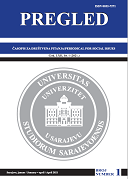GENOCID NAD BOŠNJACIMA SREBRENICE 1995. GODINE – PRETPOSTAVKA ZA NJEN POSEBAN DRUŠTVENO-RAZVOJNI STATUS
GENOCIDE AGAINST SREBRENICA BOSNIAKS IN 1995 – A PRECONDITION FOR ITS SPECIAL SOCIO-DEVELOPMENTAL STATUS
Author(s): Mirko PejanovićSubject(s): Military history, Political history, Studies in violence and power, Transformation Period (1990 - 2010), Present Times (2010 - today), Wars in Jugoslavia
Published by: Univerzitet u Sarajevu
Keywords: Srebrenica; genocide; Republika Srpska Army; Republika Srpska; Bosnia and Herzegovina; the international community; denial;
Summary/Abstract: A small town Srebrenica, located in the eastern part of Bosnia and Herzegovina became globally known after the genocide of 8.372 Bosniaks in July 1995. Three months before the Dayton peace agreement was signed, in November of 1995, the Army of Republika Srpska troops led by General Ratko Mladic committed genocide. Other than killing over 8.000 Bosniak men, they persecuted thousands of Srebrenica inhabitants. Radovan Karadžić and Ratko Mladić have been sentenced to life in jail for the crime of genocide committed in Srebrenica. While the international institutions and the European Union recognize this crime and work proactively on remedying its consequences, the Republic of Serbia and Republika Srpska are facing deep social and political negation of the Srebrenica genocide. This denial has been an obstacle for rebuilding the trust between Serbs and Bosniaks in Bosnia and Herzegovina and the West Balkans in general. Meanwhile, Srebrenica and its adjoining villages lack wide and systematic support for the durable return of its displaced inhabitants. There was a failed attempt in 2007 to give the city a special administrative status as a way towards reviving it. This paper will critically analyze the approach of the Bosnian and Herzegovinian, EU, and international institutions as well as that ofneigh-boring countries towards a durable and sustainable return to Srebrenica, its economic and cultural development between 1996. and 2020. This paper argues for giving Srebrenica a special status in order to promote its development supported by a law that would ensure a solidarity fund for its development.
Journal: PREGLED - časopis za društvena pitanja
- Issue Year: LXII/2021
- Issue No: 1
- Page Range: 215-232
- Page Count: 18
- Language: Bosnian

